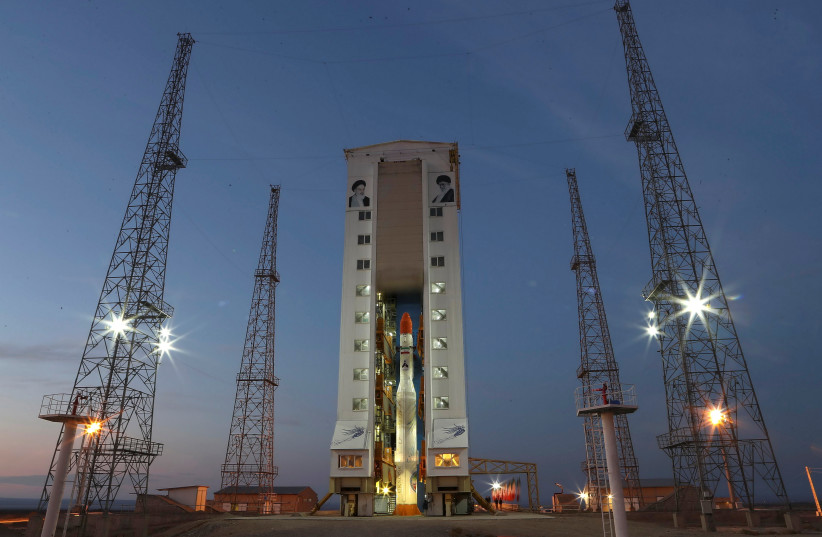A Russian rocket carrying an Iranian satellite successfully launched into space on Tuesday, causing national security and intelligence concerns for Israel and the West.
The remote sensing satellite, called "Khayyam" was launched by a Russian Soyuz rocket from the Baikonur Cosmodrome, the home of Russian space launches located in southern Kazakhstan, at 08:52 a.m. Moscow time (0552 GMT) on Tuesday, according to a video broadcast by Russia's Roscosmos space agency on YouTube.
Israeli officials are concerned that the latest space cooperation between Moscow and Tehran will increase Iran’s capabilities to potentially launch intercontinental ballistic missiles with nuclear warheads in the future, as well as improve its monitoring of targets in the Jewish state and throughout the region.
An additional concern for Jerusalem could be this and future Russian-Iranian satellites reducing Israeli spies’ ability to penetrate the Islamic Republic’s border with operations which hold back its nuclear progress.
Meanwhile, the US and the West are concerned that the satellite could be used by Moscow to boost its intelligence capabilities in Ukraine.
Tehran has rejected the West’s claims, saying Iran will have full control and operation over it “from day one,” though this did not assuage Israeli concerns.
Iran says the satellite is designed for scientific research including radiation and environmental monitoring for agricultural purposes.
Iran’s space organization has received the first telemetry data sent from the Khayyam satellite.

White noise or security concern?
This is the second time in three months that Russia has made noise about its assistance to Iran in the satellite technology sphere. Russia has sought to deepen its ties with Iran since February 24, when the Kremlin ordered tens of thousands of troops into Ukraine.
In July, Russian President Vladimir Putin visited Iran on his first international trip outside the former Soviet Union since the start of Russia’s military campaign in Ukraine. While there, Iran’s supreme leader Ayatollah Ali Khamenei told Putin that Tehran and Moscow needed to stay vigilant against “Western deception.”
In past Russian-American crises, space had been one field where the sides found a way to maintain cooperation and strong ties despite geopolitical tensions.
Roscosmos and NASA recently inked a deal to carry each other’s astronauts to the International Space Station (ISS), but Moscow has declared its intent to quit the ISS at some point in the future.
In mid-June, The Washington Post reported that Russia was preparing to provide Iran with an advanced satellite that would enable it to track potential military targets across the Middle East, sending shudders through much of the region. The Post followed up with another report with similar concerns last week.
Anonymous Israeli officials told KAN in mid-June that they were concerned by the report, while US officials in public did little to dispel the mystery surrounding the issue.
In addition, officials were worried that Tehran might acquire photos and pass them on to proxies like Hezbollah and Hamas to increase the accuracy and effectiveness of their destructive power.
Putin had called the report “garbage,” but the Russian leader rarely admits to controversial actions that he orders.
The mid-June report had said that the new satellite would allow “continuous monitoring of facilities ranging from Persian Gulf oil refineries and Israeli military bases to Iraqi barracks that house US troops,” citing three unnamed sources – a current and a former US official and a senior Middle Eastern government official – briefed on the sale.
Though the Kanopus-V reported on in mid-June is marketed for civilian use, seemingly similar to the Khayyam, Iran’s Islamic Revolutionary Guards Corps officials had reportedly made several trips to Russia since 2018 to work on Russian-Iranian space cooperation.
Further, the report said that Russian experts traveled to Iran this spring to train crews who would operate the satellite from a newly built facility near Karaj, west of Tehran.
The mid-June satellite report said it would feature Russian hardware, “including a camera with a resolution of 1.2 meters – a significant improvement over Iran’s current capabilities, though still far short of the quality achieved” by US or Israeli spy satellites.
The IRGC announced in April 2020 that it had successfully launched the country’s first military satellite into orbit. This led former US secretary of state Mike Pompeo to demand consequences before the UN Security Council.
In a press briefing in June, US State Department Deputy Spokeswoman Jalina Porter responded to a question about the Russian-Iranian satellite cooperation without taking a clear position. The US has not yet commented about the latest Russian-Iranian launch.
Israel space program chief and Maj. Gen. (res.) Isaac Ben-Israel was unfazed by concerns from the mid-June report, saying that it lacks any strategic significance.
To an average reader, a satellite that can get pictures within 1.2 meters from the ground sounds phenomenal. However, he said, currently Iran and any other country can buy satellite photos from the commercial sector at a mere $10,000 per shot, which are three times better.
